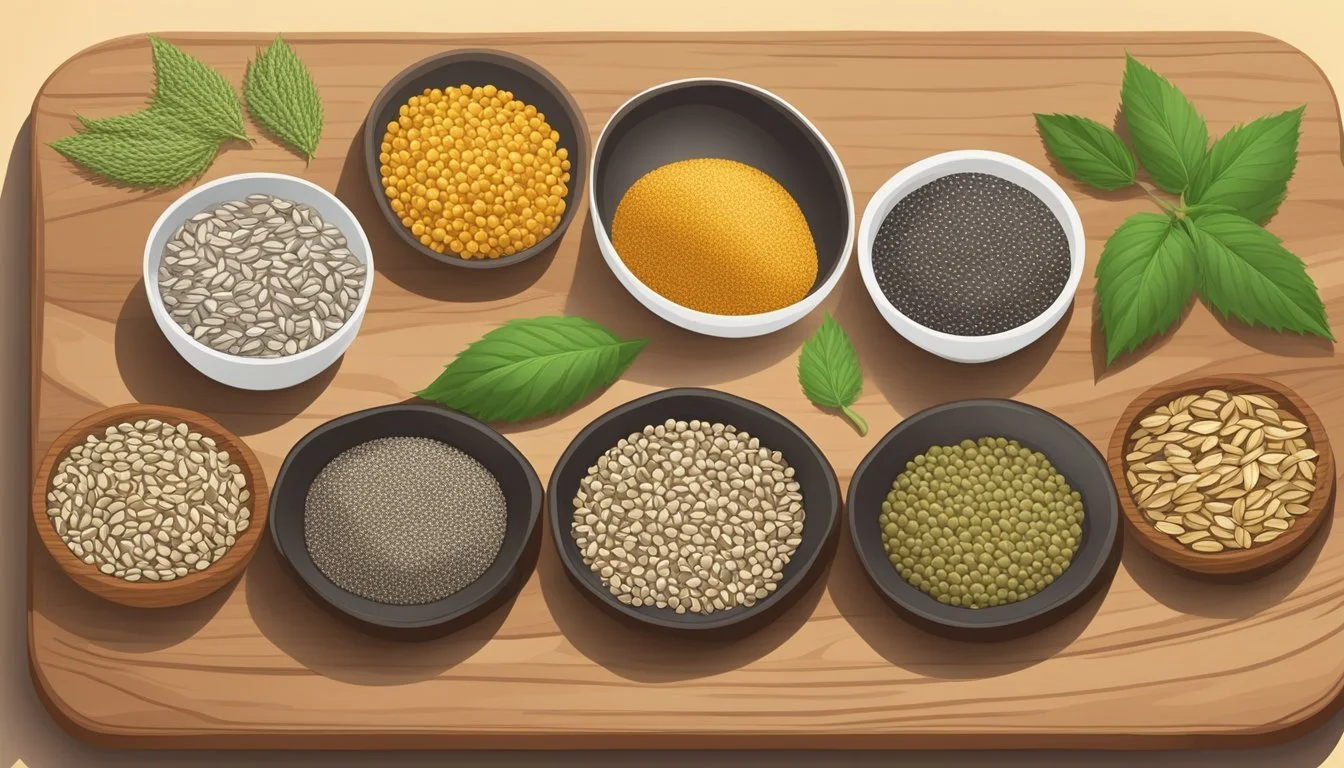Hemp Seed Substitutes
Top Alternatives for Your Dietary Needs
Hemp seeds are popular for their nutritional value and versatility in recipes, offering protein, essential fatty acids, and other vital nutrients. However, access to hemp seeds may sometimes be limited by availability, dietary preferences, or a need for variation in diet. In such cases, a variety of substitutes can offer similar health benefits and can be incorporated into meals to maintain a nutritious diet.
Sunflower seeds are a viable alternative, and like hemp seeds, they can be sprinkled over salads, cereals, and baked goods to enhance flavor and nutritional content. While they contain less protein than hemp seeds, sunflower seeds are a good source of amino acids, vitamin E, and minerals such as calcium, iron, and magnesium. Their nutty, earthy taste makes them an appealing option for those looking to maintain a diverse and health-conscious diet.
For a substitute with unique properties, chia seeds stand out due to their ability to absorb water and form a gel, making them particularly useful in creating puddings or as a thickening agent. Moreover, flaxseeds, with their rich content of omega-3 fatty acids and fiber, serve as another healthful replacement for hemp seeds. Both chia and flaxseeds can act as binding agents in recipes, mimicking the texture that hemp seeds might otherwise provide, while contributing to a balanced, nutritious eating plan.
Understanding Hemp Seeds
Hemp seeds, often considered a powerhouse of nutrition, are recognized for their high-quality protein content, rich fatty acid profile, and diverse culinary applications.
Nutritional Profile
Hemp seeds are a notable source of essential fatty acids, including omega-3 and omega-6 fatty acids, which are crucial for heart health and immune system function. They also provide a substantial amount of fiber, benefiting digestive health. These seeds contain an impressive array of vitamins and minerals. Here is a breakdown of their nutritional components:
Protein: Hemp seeds are a complete protein, containing all nine essential amino acids that the body cannot produce on its own.
Healthy Fats: High in essential fatty acids, with a balanced ratio of omega-3 to omega-6.
Vitamins and Minerals: Rich in Vitamin E, Magnesium, Zinc, and Iron, all necessary for a variety of bodily functions.
Antioxidants: The presence of compounds like Vitamin E contributes to the antioxidant properties of hemp seeds.
It's these health benefits of hemp seeds that make them a valuable addition to a balanced diet.
Culinary Uses
Hemp seeds boast a mild, nutty flavor, making them versatile in the kitchen. They can be easily incorporated into numerous dishes. Here's how they are commonly used:
Salads: Sprinkle them on for added texture and nutrients.
Baked Goods: Mix into bread or muffin recipes for a nutritional boost.
Smoothies: Blend in to thicken and enrich with proteins and healthy fats.
Oatmeal: Stir into your morning oatmeal for a hearty start to the day.
Cereals and Pesto: Enhance these items with a handful of hemp seeds.
Whether one is looking to enrich the nutrient profile of their meals or simply enjoy a different taste, hemp seeds are adaptable to a wide range of recipes.
Top Hemp Seed Alternatives
When searching for hemp seed substitutes, one seeks ingredients that offer comparable nutritional benefits, such as a balance of omega-3 fatty acids and protein, while also contributing to the texture and flavor profile of various dishes. Below are prime alternatives that cater to varied dietary requirements and culinary uses.
Chia Seeds
Chia seeds serve as an excellent hemp seed alternative due to their rich omega-3 content and significant fiber content. They possess the unique ability to absorb water and swell, which makes them ideal for preparing chia pudding or as a thickening agent in recipes.
Flaxseeds
Flaxseeds are known for their high levels of fatty acids and lignans, contributing to heart health and offering antioxidant properties. These seeds are typically available in whole form or as ground flaxseed, and their gluten-free nature makes them a popular choice in various dietary regimens.
Pumpkin Seeds
Often referred to as pepitas, pumpkin seeds are another nutritious substitute, offering a boast of minerals like magnesium and zinc, as well as healthy fats. They can provide a crunchy texture and nutty taste to salads and baked goods.
Sunflower Seeds
Rich in vitamin E and protein, sunflower seeds add a distinctive taste and crunch. They are considered a good source for various nutrients including fatty acids, making them a suitable topping for cereals and salads.
Sesame Seeds
Loaded with calcium, iron, and fibers, sesame seeds offer both a flavor and nutritional boost. Their petite size and pleasant texture make them a versatile addition to a variety of dishes.
Pine Nuts
Pine nuts may be smaller in size but are substantial in terms of nutritional value. Known to aid in heart health, these seeds carry a substantial amount of protein and fatty acids, ideal for enhancing a dish's nutritional aspect as well as its taste profile.
Nutrition and Health
Hemp seeds are prized for their nutritional profile, providing essential fatty acids, protein, and a range of vitamins and minerals. Substituting hemp seeds with the right alternatives can help maintain these nutritional benefits in various diets.
Heart Health and Fats
Healthy fats are crucial for heart health. Hemp seeds contain a balance of omega-3 and omega-6 fatty acids that support cardiovascular function. Alternatives like walnuts and flax seeds also offer these essential fats, with walnuts being particularly noted for their omega-3 content, supporting cholesterol management and reducing inflammation.
Protein and Amino Acids
Hemp seeds are a complete protein, meaning they contain all essential amino acids. Substitutes such as chia seeds and flax seeds provide substantial protein but lack the amino acid lysine. For individuals following a vegan or vegetarian diet, combining these substitutes with other lysine-rich foods is necessary to achieve a complete protein profile.
Minerals and Vitamins
Hemp seeds are rich in essential minerals like magnesium, iron, and zinc, which are vital for various bodily functions. Sunflower seeds can be a good substitute, offering vitamin E, calcium, phosphorus, and antioxidants. These nutrients contribute to immune health and metabolic processes.
Dietary Considerations
People following specific diets, such as gluten-free, low-carb, or keto, can benefit from hemp seed substitutes. For a gluten-free option, all seeds mentioned are suitable. Those on keto or low-carb diets might choose seeds like chia or flax for lower carb content and high fiber, which can assist in weight loss efforts.
Digestive and Brain Health
Seeds like chia and flax are high in fiber, which promotes digestive health. The presence of omega-3 fatty acids in these substitutes also supports brain health, crucial for cognitive functioning. Regular consumption of these fats is associated with reduced inflammation and enhanced mental well-being.
Alternatives for Specific Diets
When considering hemp seed substitutes, it’s important to take into account the specific dietary requirements such as vegan, vegetarian, gluten-free, and low-carb needs. These diets often have unique nutritional profiles, so choosing an alternative that aligns with these health considerations is key.
Vegan and Vegetarian Substitutes
For those following a vegan or vegetarian diet, plant-based protein is an essential component. Good substitutes that mimic hemp seeds in both texture and nutritional value include:
Chia Seeds: High in protein and omega-3 fatty acids, chia seeds are an excellent option, particularly for creating puddings or as egg replacements in vegan baking.
Flaxseeds: Similar to chia, flaxseeds are rich in omega-3 fats and can be used to make a gel-like replacement for eggs or as an addition to smoothies and yogurts.
These seeds maintain the balance of protein and essential nutrients that are crucial in a plant-based diet.
Gluten-Free and Low-Carb Options
Those on gluten-free or low-carb diets, like Keto, often need substitutes that provide the nutritional benefits of hemp seeds without the unwanted carbs. Suitable alternatives include:
Almond Flour: While typically used as a wheat flour substitute, almond flour can also replace hemp seeds in baking for added protein and healthy fats.
Buckwheat: Despite its name, buckwheat is gluten-free and offers a similar rich, nutty flavor and can be added to recipes in lieu of hemp seeds.
Desiccated Coconut: Low in carbohydrate yet high in fiber, desiccated coconut can add texture and flavor to dishes, making it a suitable hemp seed alternative especially in dessert recipes.
These options help to maintain the nutritional value and culinary versatility that hemp seeds provide, while adhering to gluten-free and low-carb guidelines.
Substitutes in Recipe Creation
When creating recipes, finding the right substitute for hemp seeds involves considering taste, texture, and nutritional content while also taking into account dietary restrictions and allergies.
Textures and Flavors
A key aspect of substituting for hemp seeds is mimicking their unique texture and flavor profile. Sunflower seeds are an excellent alternative, offering a similar nutty, earthy taste and a crunch that can complement cereals, salads, and baked goods. Flaxseeds, despite their smaller size, provide a comparable nuttiness and can be ground or used whole for a variety of textures in dishes.
Baking Alternatives
In vegan baking, substitutes for hemp seeds not only replace the texture and flavor but also the binding properties hemp seeds may provide. Chia seeds mixed with water create a gel-like consistency perfect for egg replacement, using the ratio:
1 tablespoon chia seeds + 3 tablespoons water = 1 egg
This mixture can maintain the structural integrity of pancakes, cookies, and other baked delicacies. For those seeking a low-carb option, almond meal can serve as a 1:1 substitute by volume, although the flavor will lean more towards almond's distinct taste.
Convenience and Allergies
Convenience drives many to seek hemp seed substitutes that are readily available and easy to store. Quinoa stands out for its versatile use, similar nutritional benefits, and ease of preparation. For individuals with tree nut allergies, it is imperative to avoid certain substitutes such as almond meal, opting for alternatives like flaxseeds, which are less likely to cause allergic reactions. Personal preference also plays a significant role; individuals should choose a substitute that suits their taste and dietary needs.
Considering Sustainability
When evaluating hemp seed substitutes, one must consider both the environmental implications and the diverse perspectives from local to global scales.
Environmental Impact
Hemp seeds are lauded for their minimal environmental footprint. They require less water and pesticides compared to traditional crops like cotton. The sustainability of hemp is further amplified by its ability to grow in a variety of climates. Regions like South America have recognized hemp's versatility, utilizing local sources to reduce agricultural strain.
Water Usage: Hemp thrives with minimal irrigation.
Pesticides: Naturally resistant to pests, reducing chemical use.
Crop Rotation: Hemp improves soil health, beneficial for crop rotations.
Sunflower seeds, often proposed as substitutes, also have a favorable impact though they may not match the soil-enriching properties of hemp.
Local and Global Perspectives
From a local perspective, choosing substitutes sourced from local producers can significantly reduce transportation emissions and promote regional agricultural economies.
Local Sources: Engaging with local farms minimizes carbon footprint.
Job Creation: Supports local economy and creates agricultural jobs.
Conversely, the global perspective on sustainability advocates for a unified approach where the best practices are shared and implemented worldwide, ensuring the collective reduction of environmental harm.
Cross-Border Cooperation: Sharing sustainable farming techniques.
Global Standards: Development of universal sustainability certifications.






